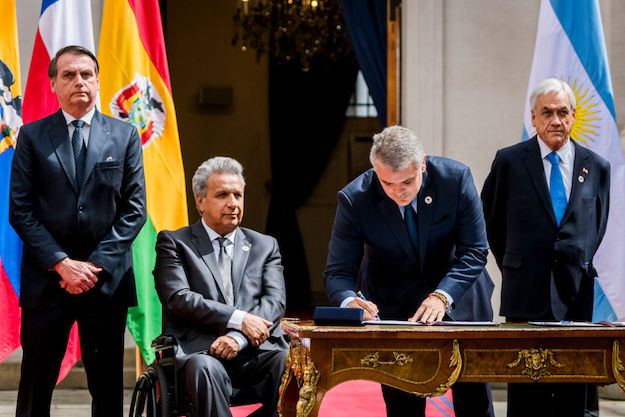BY OLIVER STUENKEL

SÃO PAULO – Argentina’s President Alberto Fernández had reason to be upbeat last week: After Luis Arce’s election victory in Bolivia on Oct. 18, the peronista will no longer be the only center-left leader in South America. Fernández used the opportunity to call for the revival of UNASUR, a nearly defunct regional organization that once comprised 12 South American nations. Yet his largely symbolic proposal merely underlined the sorry state of cooperation in the region.
After the promising development of regional rules and norms starting with the end of the Cold War, Latin America has seen a shocking breakdown of regional coordination. This has been symbolized most recently by Jair Bolsonaro’s refusal to speak to Argentina’s president Alberto Fernández, his Argentine counterpart, and Andrés Manuel Lopez Obrador’s decision to avoid traveling to the rest of Latin America altogether.
But the breakdown in coordination has deeper roots – and amid what promises to be a protracted economic crisis as the region emerges from COVID-19, the glaring lack of regional cooperation and coordination among Latin American governments will likely get worse before it gets better.
Regional cooperation in Latin America has a rather storied history. International charters such as the Santiago Commitment to Democracy (1991), the Declaration of Managua (1993), Mercosur and its democratic clause (1998), and the Inter-American Democratic Charter (2001), and the South American Defense Council (2009) all helped lay the groundwork for an unprecedented degree of political and economic cooperation. That success was felt especially in the 1990s and early 2000s, when broadly accepted commitments to democracy and a series of regionally respected leaders created healthy peer pressure that helped stabilize political affairs in moments of crisis. This was the case in 1998, when regional leaders helped Peru and Ecuador sign a peace treaty after a war in 1995, and in 1996 and 1999, when regional governments avoided a coup in Paraguay. Regional actors even convinced Hugo Chávez to restart a dialogue with Venezuela’s opposition after a failed coup in 2002.
The prospect for regional consensus in response to similar crises has faded. The Organization of American States (OAS) is no longer seen as legitimate by leaders such as Fernández and Arce, and Prosur, a grouping of right-wing governments, never got off the ground. It’s not surprising that regional governments were unable to even agree on a single candidate for the presidency of the Inter-American Development Bank, allowing the U.S. to break the long-standing tradition of reserving the top job for Latin Americans and hand it instead to Trump adviser Mauricio Claver-Carone.
A similar lack of coordination has been apparent in the region’s response to the severe environmental crisis in Brazil and one of the world’s worst refugee crises in Venezuela.
Now, with COVID-19, Latin America is rudderless and in the midst of a perfect storm. According to the United Nations Economic Commission for Latin America and the Caribbean, the region is set to suffer its worst economic crisis in 120 years, with GDP likely to decline by a staggering 9.1%, wiping out all progress made over the past decade. By the end of the year, 37.7% of the region’s population will live in poverty, a level not seen since 2006. Already the world’s most unequal region, Latin America is set to become more unequal still. To make matters worse, the region remains the pandemic’s global epicenter, responsible for one in three COVID-related deaths each day, despite representing less than 10% of the world’s population.
At a time when coordination on trade, health and immigration is more important than ever, leaders in the region are more likely to look at their counterparts as a way to shift blame or play politics. The crises last year in Bolivia, where the military forced Evo Morales to resign after a contested election, and Chile, where large-scale protests were met with extreme police violence, are a case in point. Instead of seeking to calm things down, leaders in the region poured fuel on the fire by using the episodes to mobilize their radical supporters at home. While left wing governments described Morales’ ouster as an imperialist plot without providing much evidence, right-wing governments baselessly asserted that instability in Chile was caused by Venezuelan and Cuban infiltrators seeking to overthrow the Piñera government.
The current combination of an economic and public health crisis sets the stage for significant political instability in the coming years. This will not only slow down the speed of economic recovery, but also make the region far more vulnerable to outside influence as Washington and Beijing clash over each other’s degree of influence, most visibly in the realm of 5G.
How to respond? With high-level regional cooperation unlikely to function for the foreseeable future, bureaucrats, subnational governments, civil society, academics and the private sector will have to fill the void and preserve some of the many links that have been established across the region in past decades. It will be up to them to ensure that regional dialogue is not conditional on ideological alignment.
Indeed, while deep polarization on the national level makes regional cooperation difficult – Bolsonaro, for example, uses anti-Argentina rhetoric to mobilize his core supporters – subnational governments should be freer to pursue ties with their counterparts in the region. The same is true for government bureaucrats and regulatory agencies, which can work together on technical issues – such as 5G or public health – without falling victim to the current breakdown of regional cooperation. Yet realistically, even their best efforts can only contain some of the damage. Unless regional leaders can agree to engage, institutionalized cooperation between Latin American governments across the ideological aisle is unlikely to recover.
No comments:
Post a Comment